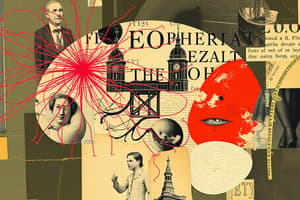Podcast
Questions and Answers
Which of the following is true about the tract of Lissauer?
Which of the following is true about the tract of Lissauer?
- It is involved in transmitting proprioceptive information.
- It is absent in the upper cervical regions.
- It is involved in neurological deficits seen in pernicious anemia (correct)
- It is a large strand capping the posterior horn.
Which of the following tracts is not a part of the anterolateral pathways?
Which of the following tracts is not a part of the anterolateral pathways?
- Fasciculus gracilis (correct)
- Fasciculus cuneatus
- Spinothalamic pathway
- Spinocerebellar tract
What is the function of the spinothalamic pathway?
What is the function of the spinothalamic pathway?
- Transmitting proprioceptive information
- Transmitting pain and temperature information (correct)
- Transmitting auditory information
- Transmitting visual information
Flashcards are hidden until you start studying
Study Notes
- The anterolateral pathways include the spinothalamic pathway and the spinocerebellar tract.
- First order neurons from dorsal root sensory fibers synapse with second order neurons in the dorsal horns of the spinal cord.
- Afferent fibers from peripheral nerves enter the spinal cord via the dorsal root and ascend/descend two spinal segments in the tract of Lissauer prior to synapsing in the dorsal horn gray matter.
- The tract of Lissauer is a small strand capping the posterior horn close to the entrance of the posterior nerve roots and is present throughout the spinal cord.
- It is most developed in the upper cervical regions and is involved in neurological deficits seen in pernicious anemia.
- During a complete occlusion of the anterior artery of the spinal cord, the tract of Lissauer is the only tract spared along with the dorsal columns.
- The spinothalamic pathway is involved in transmitting pain and temperature information.
- The spinocerebellar tract is involved in transmitting proprioceptive information.
- Other tracts within the anterolateral pathways include the fasciculus cuneatus, fasciculus gracilis, and substantia gelatinosa.
- These pathways are important for sensory perception and motor function.
Studying That Suits You
Use AI to generate personalized quizzes and flashcards to suit your learning preferences.




